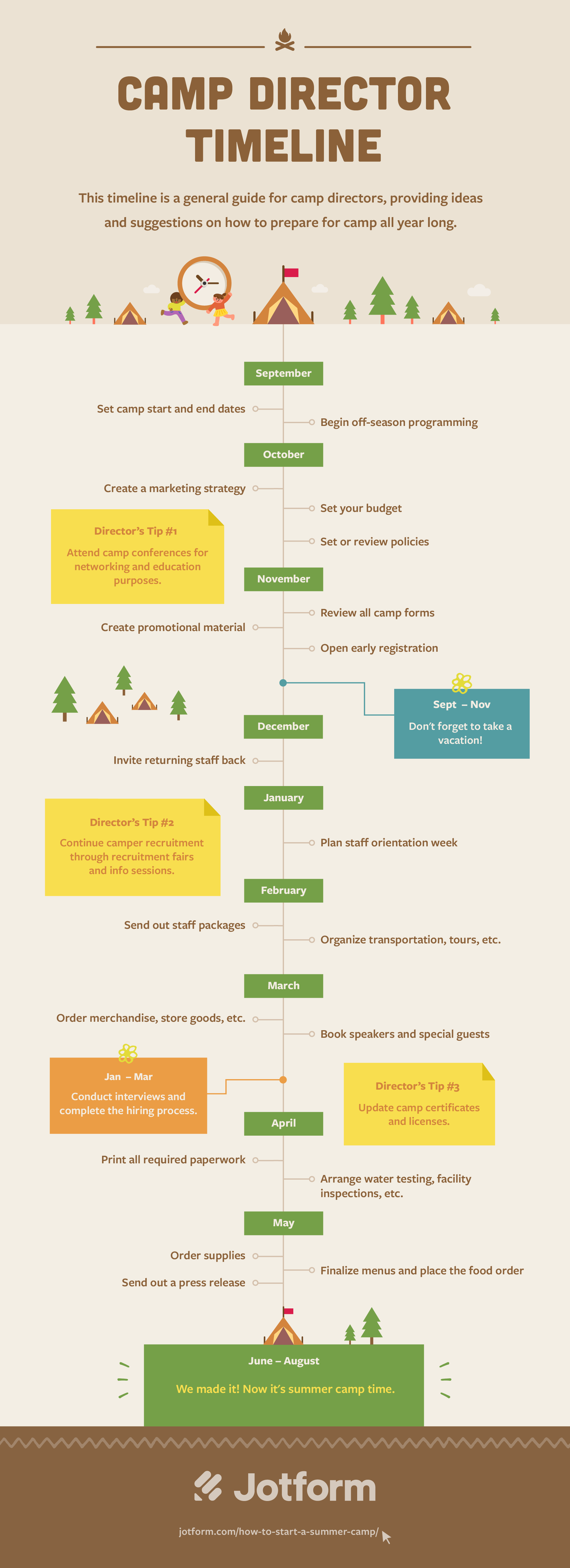Color wars.
Campfire s’mores.
Arts and crafts projects.
Jumping off “the blob.”
These are some of the nostalgic memories many of us have when we think about summers spent at camp.
In fact, there are entire shows — like this popular Disney show from the late 1990s — all about how fun summer camp is.
Behind the scenes, there’s a ton of work that happens to prepare for a fun summer.
This is something I know a thing or two about. As a former camp director, the team and I spent the entire year preparing for two months of summer camp.
In this post, we’ll talk about the job description and many of the key responsibilities involved with being a camp director.
What does a summer camp director do all year?
The job description of a camp director spans everything from administrative tasks, such as managing personnel and creating and maintaining a budget, to overseeing program changes or additions and fostering relationships with former, current, and potential campers. We’re also responsible for providing updates and reports to track the camper registration progress during the spring, and sharing an end-of-season report in the fall after camp has ended.
We report to either a board of directors or an executive director.
1. Creating the camp budget
One of the biggest responsibilities is creating a budget for the upcoming camp season. We spend a lot of time on this during the autumn and winter months.
The budget is influenced by camper registration data and trends, as well as fundraising and grant approval.
Part of our job is working closely with a development team to secure funding for special projects, capital campaigns, new program initiatives, or camperships (camp scholarships).
The decisions made during this time will dictate camper fees, programming and activity choices, and staff salaries.
2. Hiring and managing personnel
It takes a small army to run a successful summer camp. Camp directors spend the majority of the off-season recruiting and writing job descriptions. Some of the key positions include counselors, kitchen staff, maintenance staff, nurses, and other support and administrative positions.
This process includes interviewing candidates, conducting background checks (because you’re working with minors), and working with HR to collect all documents and manage payroll.
Another key role is facilitating staff development to ensure that all new team members are well-trained and prepared for the summer season.
During summer, the camp director provides constant feedback in the form of formal and informal performance evaluations of staff.
3. Evaluating camp programs
After camp ends, we spend time distributing and reviewing surveys from campers and their families. The responses to these surveys help us get a 360-degree view of how successful the summer season was, including
- Evaluating each program that was offered during camp
- Determining how popular a program was with the campers
- How much it cost to run each program
- If the program meets the mission and mandates of the camp
Based on all of this feedback, camp directors will design new programs and activities, while ensuring that they have proper facilities, supplies, staff certifications, and insurance coverage for any new initiatives. We may work closely with the development team during this process to secure funding for new and improved programs.
4. Promoting the camp
Another key responsibility is marketing the camp and driving new signups.
During the summer months, it’s all about capturing the perfect photos, camper quotes, and stories to show the positive effect that camp has on its participants. These photos, videos, and testimonials can be used in your brochures, social media posts, postcards, email newsletters, billboards, and videos to showcase the camp.
One of the most important marketing tools is word of mouth from happy campers and their parents. Camp directors work hard to surprise and delight children while they’re at camp, and we try to keep the magic of camp alive all year by sending helpful newsletters, birthday and holiday cards, and save-the-date postcards, as well as running contests and offering special discounts or bonuses to loyal camper families.
These small touches lead potential campers to register, encourage current campers to tell their friends about the camp, and build an alumni community that rallies around and supports the camp to help it grow.
Some other ways camp directors promote their camp are through booths at recruitment fairs, recreational programming and activities for school groups, open houses, and in-home parties, where groups of parents get together to hear about the benefits of camp.
5. Building reports
From analyzing camp signup trends to providing timely registration updates during the winter and spring months and reflecting on past successes and challenges at the end of each season, data is at the heart of a successful summer camp. The team relies on these reports to plan for the upcoming year(s).
The camp director is the linchpin for a successful summer camp.
Every time a camper says through tears, “I love this camp; I never want to leave” or begs their parents to come back again next year, it’s thanks to the careful planning and thought that a director put into the summer camp.
That’s a camp director’s true responsibility — bringing all the pieces together to create an amazing experience that campers will always cherish.
































Send Comment: